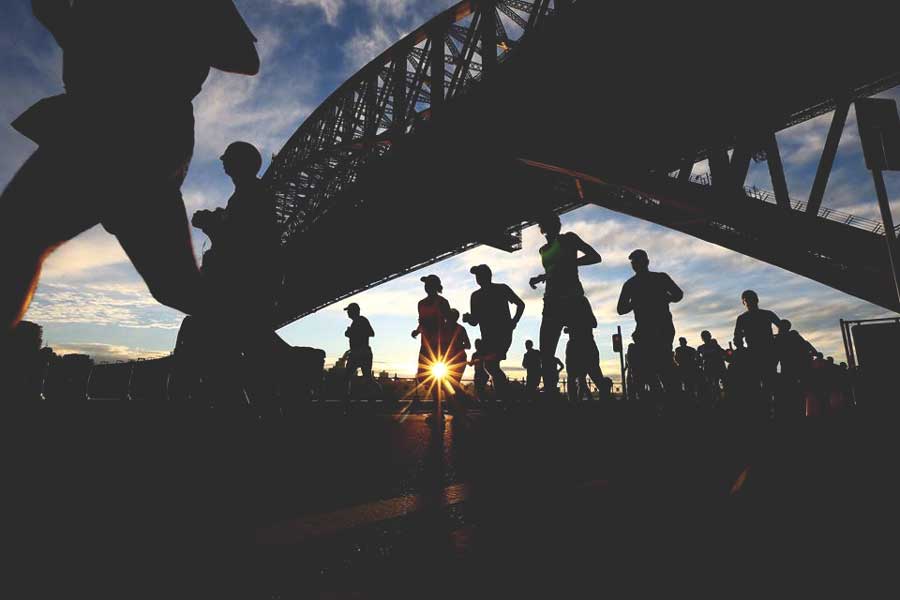
Running is definitely having a moment right now, and the second half of the year is packed full of fun runs, running festivals and obstacle courses just waiting for fit Sydneysiders to join. Have you signed up to a half marathon but aren’t sure of what to do nutrition-wise for the event? Never fear, we spoke with sports nutritionist, dietitian and triathlete Pip Taylor for her top tips for what to eat and drink before you pound the pavement on your next halfie.
So Pip, is carb-loading just a myth or is it crucial for pre-race nutrition?
Well, carb loading is a well-known practise in endurance sports in order to maximise glycogen stored in muscles that can be used for energy during the event, BUT the principles of what that means are largely misunderstood. Many think that carb loading equates to eating as much as you can, and often nutritionally poor choices in the lead up to a race. The fact is that with a reduced training load in the lead up to a half marathon, simply following normal eating patterns will provide ample energy. The other thing you often see people get wrong is hydration. Again you don’t need to go overboard; drinking too much water in the days before a race will only serve to flush out electrolytes and have you rushing off to the bathroom more frequently. It may even disturb your sleep. Instead just drink to thirst and if you need more of a guide than that, then check the colour of your urine – aim for pale straw colour. If it’s dark then you definitely need to drink more, but if it looks like water, then ease up a little on the hydration.
OK so no pasta then! What should people eat the week/ night before and morning of the race?
I am an advocate of keeping things simple and sticking to usual eating patterns and foods as much as possible. Your gut gets used to what you usually eat, and if you have trained up to an event eating certain foods, then it makes sense to stick with that. The day before (and morning of) the race are the only meals where you might consider making some adjustments. Because it takes energy to digest foods, and you are likely using a lot of extra energy mentally preparing for the race, you can make things a little easier on your digestive system. Rather than heavy meats that take longer to digest, try to include proteins such as fish or even minced steak, which are more easily digested and choose cooked vegetables rather than raw for the same reason. I would also recommend avoiding overly salty or high sugar foods – which may alter thirst sensations and water retention. Very spicy foods can also irritate your gut (if you’re not accustomed to them) and lead to stomach upset.
What do most people do wrong before an endurance race?
I think often people actually eat more than they actually need. Yes, fuelling appropriately is critical, and especially for those stepping up in race distance or competing for the first time, energy intake is important in order to finish successfully, but I often see people going way overboard compared to what they actually need. I think there is a perception that vast amounts of calories are burnt during a run, and that you need to eat/drink as much as what you are using. The idea is not to try and replace the energy you are burning – it’s neither necessary nor beneficial. You actually want to ingest just enough to maximise performance.
What are your tips for eating before a half marathon?
Keep it simple and familiar and not too big! Finish eating about 1.5 -2 hrs before the start then sip on water to thirst. A gel or banana or something similar taken 10-20 mins before the start to top things off.
What are your general tips for gels/ electrolytes/ water during the race?
This is something that is best tested out during your training. Each person is going to differ in terms of how much they need – at the pointy end of the race, some runners will be finished in just over an hour, for others it will take several hours. The recommendation is to aim for about 30-60g/hr of carbohydrate for optimal performance. As to what you use – sports drinks, gels, bars, bananas, dates – that is very individual. Even the taste of a gel or drink can really affect how well it is tolerated. If you know beforehand what nutrition will be provided on course, then try that in training. That way if you know you just can’t stomach it, you can be prepared and carry your own. In terms of fluids, I advocate for runners to be guided by thirst. Electrolytes and flavoured sports drinks may encourage drinking, and if it is very hot then electrolytes can be important. Again, practice in training. And have a plan, but be prepared to change that plan while out there racing according to how you feel!
What are the best post-race snacks to have?
Something with some quality carbs and protein as well as some fluids. I am a big believer in using whole real foods as much as possible. While sports drinks and gels might be convenient during/before a race, you should be able to plan on having something nutritious post-race. Ideally you would have something soon after the finish, but to be honest if you are not racing again in the next few days, then this timing becomes less important – although good recovery will of course help you feel better for other activities such as family, work etc. I would go for something like a smoothie or a fruit and nut bar, a peanut butter sandwich, chicken and rice or baked sweet potato, fruit and yogurt.
Pip Taylor is an accredited sports nutritionist and accredited dietitian, professional triathlete, author, mother of two and ambassador for Saucony Australia. Her sporting career spans over 15 years and includes multiple appearances at World Championships representing Australia, multiple World Cup and 70.3 wins, and podium places and victories in other major international triathlon races.


